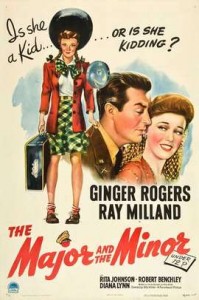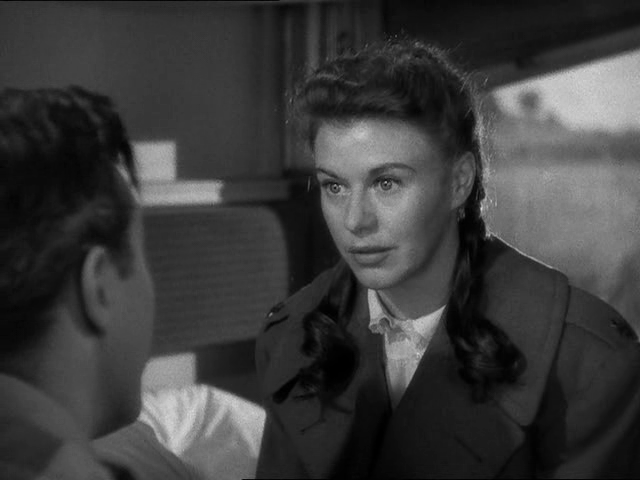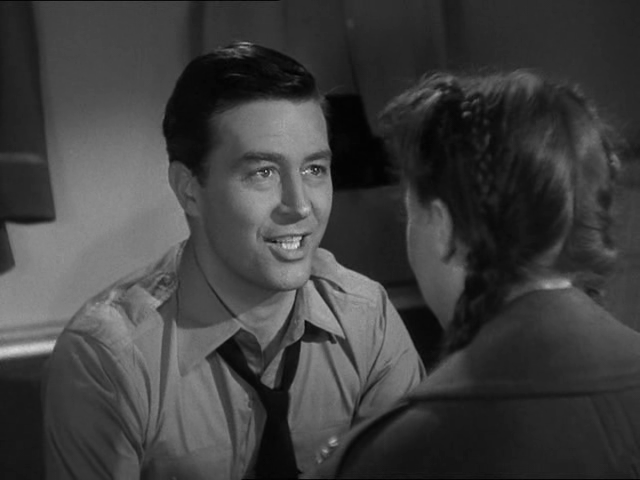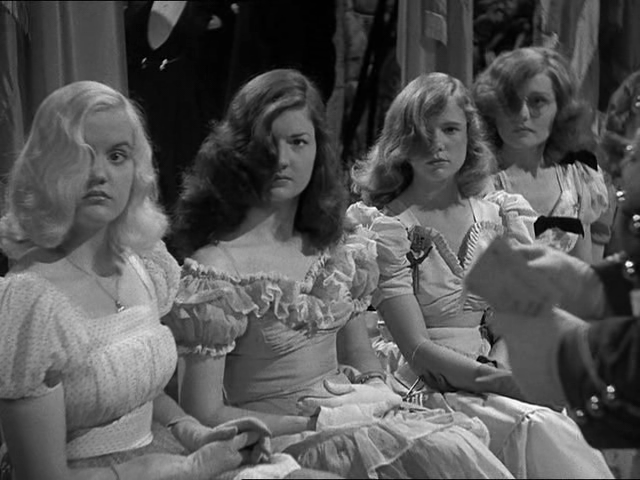|

Synopsis:
A young woman (Ginger Rogers) poses as a 12-year-old in order to buy a half-price train ticket, and falls for a kindly Army major (Ray Milland) who takes her under his wing. When visiting the military academy where Milland works, she enchants all the boys on campus, and poses a threat to Milland’s jealous fiancee (Rita Johnson).
|
|
Genres, Themes, Actors, and Directors:
- Billy Wilder Films
- Comedy
- Ginger Rogers Films
- Military
- Mistaken or Hidden Identities
- Ray Milland Films
Review:
Billy Wilder’s directorial debut remains — as DVD Savant describes it — a “consistently hilarious, effortlessly diverting show”, one which “would lighten the spirits of someone on death row”. The premise is so silly and unbelievable that one happily suspends disbelief from start to finish, instead simply enjoying the ruse and rooting for the enormously appealing protagonists (Rogers and Milland). In his discussion of Rogers’ performance in Alternate Oscars (where he offers Rogers a split Best Actress Award, along with Carole Lombard for her work in To Be or Not to Be), Peary points out that “her attempts to be a kid aren’t particularly convincing”, given that “she can’t resist saying things with double meanings or under her breath”; despite her attempts to “keep her eyes wide and goofy”, to “walk awkwardly and graceless”, and to “display a vivid imagination”, her inner wisecracking dame shows through time and again. Yet this is precisely what makes her performance so amusing — and why we’re charmed by Milland’s apparent inability to see through her ruse.
In a much less showy — but equally pivotal — role, Milland is perfectly cast as the kind-hearted yet hopelessly naive military man who takes SuSu under his wing. Given that the film eventually becomes a study in thinly veiled pedophilia (!), believing in his good graces (which we do) is essential. The film’s first half-hour — in which we witness “scalp massager” Rogers reaching her breaking point while being propositioned by a lecherous client (Robert Benchley) in New York, and “meeting cute” with Milland on the train — is probably its best; but the remainder of the storyline (taking place primarily at Milland’s military academy, where SuSu copes with dozens of would-be adolescent suitors) offers enough chuckles to keep us consistently amused. As DVD Savant points out, “The irony is that Susan ditched the Big Apple to be free of unwanted advances, only to be mauled and chased by a bunch of girl crazy” military cadets; she’s simply irresistible! The subplot involving Milland’s conveniently unsympathetic fiancee (Rita Johnson), who “keeps foiling his attempts at a transfer” to active duty, is slight but forgivable as a narrative device; more disappointing is the overly simplistic ending. However, this is easy to overlook in the face of what remains an otherwise most enjoyable romantic farce.
Redeeming Qualities and Moments:
- Ginger Rogers as “SuSu”

- Ray Milland as Major Kirby

- Plenty of delightful exchanges and scenes

Must See?
Yes, as an all-around good show. Listed as a film with Historical Importance and a Personal Recommendation in the back of Peary’s book.
Categories
Links:
|




One thought on “Major and the Minor, The (1942)”
A must – a thoroughly charming (one might say “beguiling”) comedy classic which never fails to entertain; a repeat viewing is always as sparkling as the first.
The leads and the supporting cast join forces with a perfectly realized and endlessly inventive script.
Certainly things start out a little ‘creepy’ with Benchley. As the client getting a scalp treatment, just about everything he says shows not only that he has a history of inviting women to come to him under false pretenses but also that his only goal is to conquer Rogers. It’s interesting to see how fast Rogers catches on – while simultaneously deciding she’s had enough of urban wolves. ‘TM&TM’ is clear about its point that wolves rule everywhere – where a certain kind of bait is concerned – which, in turn, points up why Rogers is so quick to fall for Milland. In all the times I’ve seen this film, I’ve not once thought of the possibility of ‘thinly veiled pedophilia’: Milland’s words and actions are so clearly paternal (as if he can’t wait to have a child of his own and is enjoying the practice of fatherhood) that he reveals an untarnished purity – he’s even uncomfortable talking with Rogers about sex, when he feels compelled to give her a lesson in ‘the birds and the bees’…or, in this case, moths and light.
To me, it’s particularly funny that no one around Rogers doubts that she’s “twelve…next week”. No one, that is, except Diana Lynn as Johnson’s younger sister, who nails Rogers on meeting her: “Oh, get up and stop that baby talk, will you? You’re not twelve just because you’re acting like six.” (Lynn is hilarious.)
‘TM&TM’ has an innocence that has kept it fresh. I hadn’t seen it in awhile and again found it a sheer delight!
(I don’t find the ending ‘simplistic’ at all. It seems a very economic wrap-up to me, as if the two leads let each other know in shorthand that there’s no point in going over the details of the truth; the important thing is they’re meant for each other.)